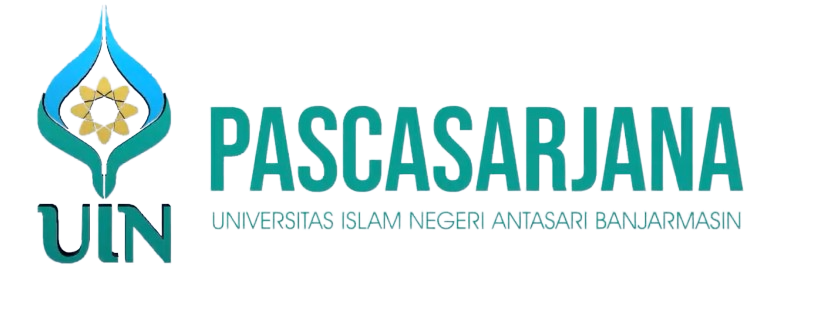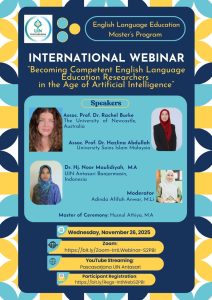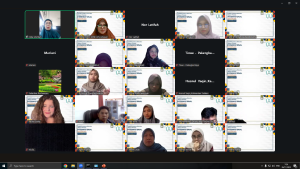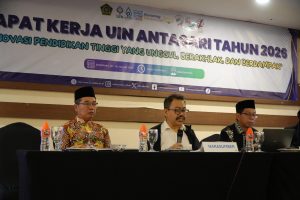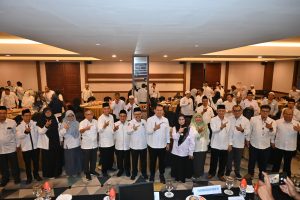AI in English Language Education: Pascasarjana UIN Antasari’s International Webinar Explores New Frontiers”
- Posted by S2_PBI
- Categories Berita Utama
- Date 26/11/2025
Banjarmasin, November 26, 2025 — The Master’s Program in English Language Education (S2 PBI) of the Postgraduate Program of Universitas Islam Negeri Antasari Banjarmasin recently hosted a successful International Webinar that attracted the attention of academicians, researchers, and education practitioners. The webinar, themed “Becoming Competent English Language Education Researchers in the Age of Artificial Intelligence,” took place on Wednesday, November 26, 2025, via Zoom and was attended by hundreds of participants.
In her opening remarks, the Rector of UIN Antasari Banjarmasin, Prof. Dr. Hj. Nida Mufidah, M.Pd., stated that this event was part of the university’s commitment to supporting research development in the field of education, particularly in utilizing rapidly advancing technologies. “In this digital era, artificial intelligence (AI) opens up many new opportunities in educational research. We hope that through this event, participants will gain a better understanding of how AI can be ethically and effectively utilized in research, while continuously fostering innovation in the academic world,” said Prof. Nida Mufidah.
The event featured three distinguished speakers who are experts in the fields of English language education and technology. The first speaker, Assoc. Prof. Dr. Rachel Burke from The University of Newcastle, Australia, presented on “Opportunities for English Language Education Research in an AI-Driven Era.” In her presentation, Dr. Rachel Burke discussed the various affordances of AI tools to support language learning, which can accelerate research processes and broaden the scope of studies in English language education. “AI offers great potential for exploring deeper data, analyzing patterns in language learning, and providing opportunities to design more personalized and adaptive teaching methods. With AI, we can create more interactive and data-driven language learning experiences,” she explained. However, Dr. Rachel Burke also emphasized that while AI has many benefits in supporting research and language learning, human feedback remains irreplaceable, especially in cultural, social, and pragmatic contexts. “Although AI can provide precise and rapid analysis, human feedback remains more authentic when it touches on cultural nuances, social contexts, and the pragmatic aspects of communication. AI cannot fully comprehend the meaning embedded in complex social interactions or convey the cultural nuances that are vital in language learning,” she added.
In addition to Dr. Rachel Burke, Dr. Hj. Noor Maulidiyah, M.A., Head of the Master’s Program in English Language Education at UIN Antasari, presented on “Responsible Use of Artificial Intelligence in Research and Writing.” Dr. Noor Maulidiyah emphasized the importance of using AI ethically and transparently in the research world. “As researchers, we must always maintain scientific integrity in every work we produce. The use of AI should enhance the quality of research without compromising the fundamental ethical principles in academia,” she explained. Dr. Noor Maulidiyah also added that transparency in the use of AI tools is crucial. “Researchers must clearly acknowledge the use of AI in their research processes, whether in data analysis or in manuscript writing. Proper recognition of AI’s role will help ensure the integrity of the research remains intact,” she said. Dr. Noor Maulidayah also stressed the importance of avoiding practices such as plagiarism and data fabrication in AI-assisted research. “While AI can assist researchers in drafting or analyzing data, there should be no misuse, such as copying results from AI or fabricating research data. These are practices that every responsible researcher must avoid,” she emphasized.
The third session featured Assoc. Prof. Dr. Hazlina Abdullah from Universiti Sains Islam Malaysia, who shared her insights in a presentation titled “The Researcher’s Creed: Redefining Competence in the Age of AI.” In her presentation, Dr. Hazlina Abdullah encouraged participants to reconsider the concept of researcher competence in the age of artificial intelligence. She emphasized that “integrity is your highest competence” for every researcher. Dr. Hazlina Abdullah also highlighted several key points regarding the use of AI in research, including creativity, ethical constraints, and critical thinking. “The use of AI in research indeed offers many conveniences, but we must always prioritize creativity in designing research that aligns with academic values. Moreover, we are confronted with significant ethical challenges that come with the use of this technology. Equally important, critical thinking is essential to objectively assess the data generated by AI and to avoid the pitfalls of using technology without a deep understanding,” she stated.
The International Webinar was moderated by Adinda Afifah Anwar, M.Li. and hosted by Husnul Athiya, M.A., who ensured the smooth and interactive flow of the event. In addition to the presentations, participants were given the opportunity to ask questions to the speakers, resulting in a highly productive and beneficial discussion. Participants warmly welcomed the opportunity to ask questions and share views on the challenges and opportunities in English language education research in the AI era.
Through this event, the Postgraduate Program of UIN Antasari Banjarmasin hopes to continue strengthening its international academic network and make a significant contribution to the development of English language education research, especially in the utilization of AI. The webinar also aims to open up more opportunities for collaboration between researchers and academics globally.
For those who were unable to attend the event live, the webinar recording is available on the UIN Antasari Banjarmasin Postgraduate YouTube channel.
#InternationalWebinar #ELTResearch #ArtificialIntelligence #UINAntasari #MPBI_UIN_Antasari
You may also like
Utamakan Sinergi dan Koordinasi, Pascasarjana Adakan Rapat Dosen Pengajar Semester Genap 2025/2026
Menjelang dimulainya perkuliahan semester genap tahun akademik 2025/2026, Pascasarjana memulai geliatnya dengan menjalin sinergi dan koordinasi antara Dosen Pengajar, Pimpinan Pascasarjana dan Pengelola Prodi. Untuk menjalin sinergi tersebut maka pada hari Jumat, 6 Februari 2026 bertempat di Aula Pascasarjana diadakan …
